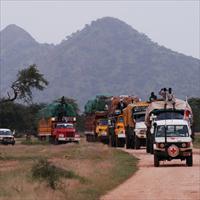Logistic effort to supply medicines to the Democratic Republic of the Congo

A massive logistic effort is under way to ensure continuous supply of life-saving medicines to hundreds of thousands in the Democratic Republic of the Congo. As part of that effort, starting tomorrow, Saturday, 15 November, 22 tonnes of medical supplies, including anti-diarrhoeal disease medicines, will leave Kampala for Goma on an arduous three to four-day truck journey. While the difficulties in transporting these supplies are immense, the biggest challenges are to identify exactly where these medicines are needed most and for which health conditions.
"We know that communicable diseases and lack of health care will be the major killers, but what we don't know in enough detail is how big the problems are in each specific location," said Dr Alessandro Loretti, Director of Emergency Operations for WHO’s Health Action in Crises.
"We are working in a vast insecure area, where health systems are under extreme stress, communities are scattered, isolated and moving and roads are poorly maintained," Dr Matthieu Kamwa, WHO Representative to the Democratic Republic of the Congo added. "People's health needs stem from lack of security, food, water, sanitation and health care. Our challenge is to define how many people are at risk exactly where in North and South Kivu."
It is this clarity that is being sought now by WHO and other health agencies. These groups are working together as part of the Health Cluster that coordinates the delivery of health services to those affected.
Almost 60 tonnes of emergency health supplies, which have been donated by the Italian and Norwegian governments, have been flown from Oslo, Brindisi and Dubai into Kampala, the capital of Uganda.
From Kampala, the supplies will continue into numerous points in eastern and northern parts of the Democratic Republic of the Congo. Kampala was chosen as a safe location to store the materials amid fears that they could have been damaged or stolen if stored in the conflict area. It is likely that more supplies will be needed.
The World Food Programme is providing WHO with critical support to deliver by air and land, as well as to safely store, these supplies. What is available now can treat and protect up to 300 000 people for one month for conditions ranging from cholera, measles, malaria and violence-related wounds.
At least 20 local health facilities were functioning in North Kivu before the recent escalation of violence. But today, WHO is aware of only one of these facilities operating in Goma and one in Rutshuru. Separately, multiple temporary health facilities have been established by NGOs. Health facilities have been looted and damaged, while national health workers have also been forced to leave their posts and flee with their families. This void is being filled by NGO health staff.
Irrespective of violence, most people die from unnecessary, easily avoidable causes due to banal situations. In such complex emergencies, pregnant women and their infants could die if deliveries occur without medical assistance. Also, untreated pneumonia, measles, malaria and even common diarrhoea will kill children in such situations.
 Back and Next - Back and Next
Back and Next - Back and Next See Also - See Also
See Also - See Also